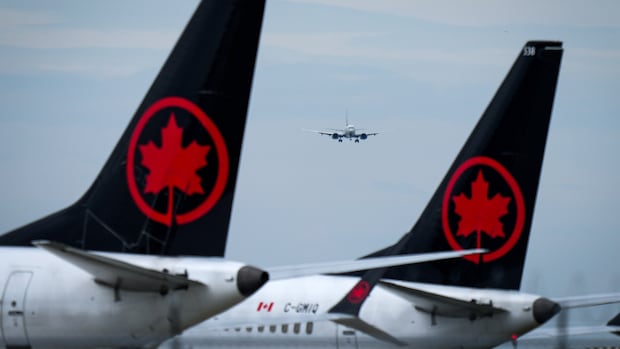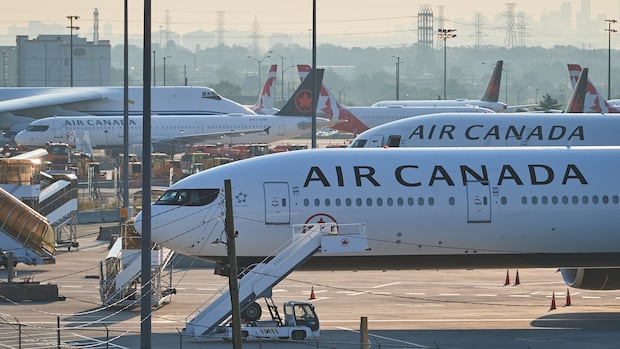Air Canada is reducing a number of non-union management positions, it said Thursday.
The airline “arrived at the difficult decision” to cut some positions after an “extensive review,” vice-president of corporate communications Christophe Hennebelle said in a statement to CBC News.
“Air Canada regularly reviews its resources and processes to ensure they are optimized to efficiently support business operations and its customers,” he said.
Hennebelle said the reductions amount to approximately one per cent of Air Canada’s total staff; about 400 people.
Hennebelle did not respond to questions about whether the positions would be reduced through attrition or by not filling vacant jobs.
He said the cuts would “not have any impact on day-to-day operations.”
Toronto Island expansion
The job cuts happened the same day Air Canada announced it would expand service from Toronto’s Billy Bishop airport, including four new daily flights to U.S. destinations — New York, Boston, Chicago and Washington, D.C. — as well as two new flights to Ottawa and one to Montreal.
The U.S. flights will begin in the spring, while the additional trips to Montreal and Ottawa will start in January. Air Canada already runs eight daily flights from Toronto Island to Montreal and four to Ottawa.
“This is our most significant expansion at Toronto Island since Air Canada first served the airport 35 years ago,” Air Canada executive vice-president and chief commercial officer Mark Galardo said in a news release earlier in the day.
The new Air Canada routes mark an escalation in the emerging rivalry between Porter and the flag carrier.
Porter is headquartered at Billy Bishop and already services the four U.S. cities.
The bulk of Air Canada’s domestic and international service is operated from Toronto’s Pearson airport.
Air Canada is due to release it’s third quarter results on Nov. 5.
But in an estimate released last month, the airline stated that it saw a two per cent decline in operating capacity, compared to the same period last year, as a result of more than 3,200 flight cancellations in August, when unionized flight attendants walked off the job.
Strike fallout
Air Canada grounded flights on Aug. 16 after some 10,000 flight attendants went on strike.
Within hours, Jobs Minister Patty Hadju ordered the company and Canadian Union of Public Employees (CUPE), which represents the airline’s flight attendants, to go to binding arbitration and the employees to return to work.
CUPE and the flight attendants defied the back-to-work order and continued the job action until Aug. 19, when the two sides reached a tentative agreement.
Flight attendants overwhelmingly rejected the airline’s wage offer last month and CUPE later requested an end to mediation and reached an agreement with Air Canada to proceed to binding arbitration.
WATCH | Flight attendants reject Air Canada wage increase offer:
Air Canada flight attendants vote against airline’s latest wage offer
Air Canada flight attendants voted against the airline’s latest wage proposal, the Canadian Union of Public Employees said Saturday. An overwhelming 99.1 per cent of its members rejected the offer.
The airline estimates the strike had a financial impact of $375-million in operating income.
Air Canada and other airlines have also seen a drop off in travel to the U.S. in response to President Donald Trump’s trade war with Canada, causing air carriers to adjust schedules on U.S.-bound flights.
According to Statistics Canada data from September, the number of Canadian residents returning from the U.S. by air declined 27.1 per cent from the same month last year.

